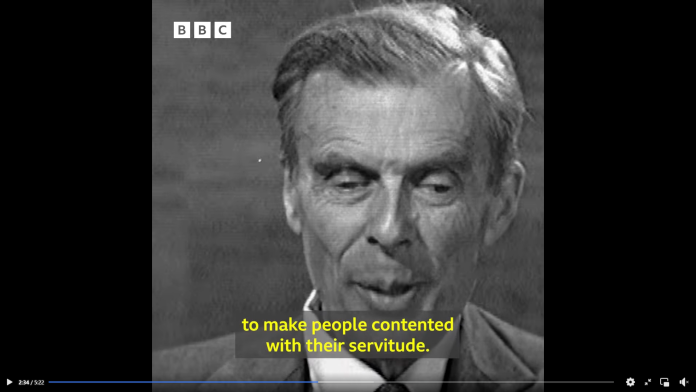Contentment in Servitude: A Reflection on Aldous Huxley’s Brave New World
Aldous Huxley’s Brave New World remains a seminal work of dystopian literature, offering a chilling vision of a society where individuals are conditioned to embrace their own subjugation. Published in 1932, the novel explores a futuristic world where technological advancements and psychological manipulation have eradicated conflict, desire, and individuality. At its core, Brave New World poses a profound question: can people become so contented with their servitude that they no longer recognise it as oppression? Huxley’s answer, disturbingly, is yes.
The Illusion of Happiness
In the World State, happiness is not a byproduct of freedom or self-fulfilment but a carefully engineered construct. Citizens are conditioned from birth to accept their predetermined roles in society, whether as Alphas, Betas, or the lower-caste Epsilons. Through hypnopaedia (sleep-teaching) and other forms of indoctrination, they are taught to equate their assigned status with personal satisfaction. The mantra “everyone belongs to everyone else” reinforces a collectivist ideology that discourages individuality and critical thought.
Huxley’s dystopia achieves stability not through coercion but through the manipulation of desire. The citizens of the World State are kept docile by a constant stream of distractions: recreational sex, the feel-good drug soma, and immersive entertainment. These pleasures serve as opiates, numbing any potential discontent or curiosity about the world beyond their conditioning. As Mustapha Mond, one of the World Controllers, explains, “The secret of happiness and virtue is liking what you have to do.” In this society, freedom is sacrificed for comfort, and the people are complicit in their own subjugation because they have been taught to equate happiness with compliance.
The Erosion of Individuality
One of the most unsettling aspects of Brave New World is the way it portrays the loss of individuality. In the World State, personal identity is subsumed by the collective. Relationships are superficial, art and literature are banned, and history is rewritten to serve the interests of the ruling class. The characters, such as Bernard Marx and John the Savage, who exhibit traces of individuality or discontent, are either ostracised or driven to despair.
Huxley suggests that true individuality requires struggle, pain, and the freedom to make mistakes; elements that are systematically eradicated in the World State. By eliminating these challenges, the society also strips away the very qualities that make us human: creativity, ambition, and the capacity for deep emotional connections. The citizens of the World State are not so much living as they are existing, their lives reduced to a series of pleasurable but meaningless routines.
A Warning for the Modern World
Huxley’s vision of a society contented with its servitude is particularly relevant in the modern era. While we may not live in a world of soma and hypnopaedia, we are increasingly surrounded by technologies and systems designed to pacify and distract. Social media, consumerism, and instant gratification have created a culture where superficial pleasures often take precedence over deeper, more meaningful pursuits. Like the citizens of the World State, many of us are complicit in our own distraction, trading privacy, autonomy, and critical thought for convenience and comfort.
Moreover, Huxley’s novel raises important questions about the role of authority in shaping our desires. In the World State, the government does not need to use brute force to maintain control; instead, it manipulates the desires of its citizens to ensure their compliance. This subtle form of control is perhaps more insidious than overt oppression because it is harder to recognise and resist. As Huxley himself warned in his later work, Brave New World Revisited, “The greatest triumphs of propaganda have been accomplished, not by doing something, but by refraining from doing. Great is truth, but still greater, from a practical point of view, is silence about truth.”
In summary, Brave New World is not merely a cautionary tale about the dangers of technological advancement or authoritarianism; it is a profound exploration of the human capacity for self-deception. Huxley’s dystopia shows us that oppression does not always come in the form of chains and shackles. It can also manifest as a seductive illusion of happiness, one that lulls us into accepting our own servitude.
The novel challenges us to question the sources of our contentment and to consider whether our desires are truly our own. In a world increasingly dominated by distractions and superficial pleasures, Huxley’s warning is more pertinent than ever: the price of contentment may be our very humanity. As we navigate the complexities of modern life, we must strive to preserve our individuality, our critical faculties, and our capacity for genuine connection; lest we find ourselves, like the citizens of the World State, contented in our chains.







